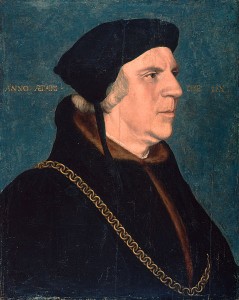 Today marks the anniversary of the death of Sir William Butts, Henry VIII’s trusted physician, on 22nd November 1545. He died at Fulham Manor, Middlesex, after suffering from a “dooble febre quartanz”, a form of malaria. Butts was buried in a tomb against the south wall of All Saints Church, Fulham, but his tomb and brass were later destroyed. In 1627, his epitaph (a slab with verses by Sir John Cheke) was restored by Leonard Butts of Norfolk.
Today marks the anniversary of the death of Sir William Butts, Henry VIII’s trusted physician, on 22nd November 1545. He died at Fulham Manor, Middlesex, after suffering from a “dooble febre quartanz”, a form of malaria. Butts was buried in a tomb against the south wall of All Saints Church, Fulham, but his tomb and brass were later destroyed. In 1627, his epitaph (a slab with verses by Sir John Cheke) was restored by Leonard Butts of Norfolk.
Butts acted as a royal physician at the court of Henry VIII from 1528 until his death. His patients included the King himself, queens Anne Boleyn and Jane Seymour, the Lady Mary (Mary I), Henry Fitzroy the Duke of Richmond, George Boleyn, Cardinal Wolsey and the Duke of Norfolk. He treated Anne Boleyn when she had sweating sickness in June 1528, and acted as her “talent spotter” when she was queen, helping her find and employ reformist scholars as her chaplains.
You can read more facts about his life in my article Sir William Butts, Royal Physician.
Also on this day in history…
- 1538 – Burning of John Lambert, Protestant martyr, at Smithfield in London. He was accused of heresy for denying the real presence of Christ in the Eucharist. As he burned at the stake he cried out “None but Christ, none but Christ!”
Is there any information on how Butts contacted malaria? Odd in that part of the world, I would think.
On the contrary, malaria was endemic in southern England at the time. (The last locally acquired cases of malaria were in the 1950s.) Henry VIII and Edward VI both suffered from malaria.
It really isn’t that cold in England (says the woman living in Winnipeg, where it ain’t winter if it’s warm enough to rain).
Hi, yes indeed malaria in England was common, so we’re varied marsh fevers as here the place was much more wetlands, marsh, swamps and bogs, mosquito of the type that carries the disease resident here, and records show Henry fell into a bog, caught marsh fever and at another time he contracted malaria. His medical records show bouts every three years of severe fevers, now we know malaria stays in the body and reoccurs, this is what Henry suffered from. Epidemics were common.
Dr William Butts sounds like a very interesting person, intersecting with all of the main events in the life of Anne Boleyn and Henry VIII. As a man with wider interests, the reforms of the church and so on I would imagine him being very influential and a great person to trust and have confidence in.
You couldn’t really call them ‘Doctors ‘ in those days, their answer to most ailments was putting leeches on the poor patient and making them drink awful concoctions of spiders webs and the eyes of newts, etc, I think it amazing in fact that the human race has survived so long when you consider all the diseases around then, Malaria the Black Death, the Sweating Sickness for example, if anyone survived those diseases they must have had very good genes.
Regarding the sweating sickness I read that the patient had to lie in bed covered up and no windows or doors open, even in the height of summer, I can’t think of anything more uncomfortable they must have felt awful, no fresh air to soothe them and they had to drink some ghastly medicine, it was such a strange disease as only English people were affected, a few foreigners did contract it but their symptons were mild.